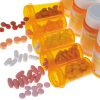- Empty cart.
- Continue Shopping
How to Store Medications Safely at Home

Introduction
Proper storage of medications is crucial for maintaining their efficacy and ensuring they are safe to use. Incorrect storage can lead to degradation of the medication, posing potential health risks. This guide aims to provide you with comprehensive information on how to store medications safely at home.
General Guidelines
Keep Original Packaging
- Always keep medications in their original containers, which contain important information like expiration dates and storage instructions.
Label Clearly
- If you must transfer medications to another container, label it clearly with the medication’s name, dosage, and expiration date.
Childproof Containers
- Use childproof containers to prevent accidental ingestion by children.
Separate Medications
- Keep different types of medications separate to avoid confusion.
Specific Storage Conditions
Room Temperature
- Most medications should be stored at room temperature, away from direct sunlight and moisture.
Refrigeration
- Some medications, like certain types of insulin, require refrigeration. Never store these medications in the freezer unless explicitly instructed.
Humidity
- Avoid storing medications in bathrooms or kitchens where humidity levels can be high.
Light Sensitivity
- Some medications are sensitive to light and should be stored in their original, light-resistant containers.
Special Medications
Controlled Substances
- Medications like opioids should be stored in a locked cabinet to prevent unauthorized access.
Liquid Medications
- Shake well before use if instructed, and use the provided measuring device for accurate dosing.
Inhalers
- Store upright and keep track of the expiration date and the number of doses remaining.
Disposal of Medications
- Follow the disposal instructions on the medication packaging or consult your pharmacist.
- Never flush medications down the toilet unless specifically instructed to do so.
- Many pharmacies offer medication take-back programs for safe disposal.
Precautions
Regular Checks
- Periodically check the condition of your medications and dispose of any that are expired or show signs of degradation.
Emergency Medications
- Keep emergency medications like epinephrine injectors and asthma inhalers easily accessible.
Travel
- When traveling, keep a small supply of essential medications in your carry-on bag in case of delays or lost luggage.
Conclusion
Proper storage of medications is essential for ensuring their effectiveness and minimizing risks. By following these guidelines, you can create a safe and organized system for storing medications at home. Always consult your healthcare provider or pharmacist if you have specific questions about medication storage.








